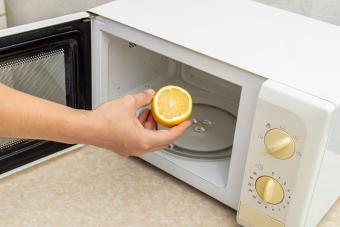
We've all been there. You're unloading a bunch of supposedly "clean" dishes and find gunk and grime still sticking to them. Luckily, when your dishwasher's not washing dishes clean enough, it's usually a simple problem to solve. We've got you covered with all the troubleshooting tips you need to get those plates sparkling clean again.
Where to Troubleshoot When Your Dishwasher Isn't Getting Dishes Clean

There are a lot of reasons your dishwasher might not be getting dishes clean, but it won't take you long to run down this list and fix any potential problems. Here's where to look if your goblets are grimy:
- Dishwasher interior that's dirty
- Filter that's clogged
- Spray arms that have build-up or clogs
- Water softener that's out of salt
- Water temperature that's too low
- Dishes not getting rinsed before loading
- Dishwasher over-loaded or not loaded properly
- Not using rinse aid
- Not using the best detergent
- Using a quick cycle for heavily soiled dishes
Your Dishwasher Interior Needs Cleaning

You'd think the inside or your dishwasher would be spotless since it gets washed so often. The thing is, the spray isn't really targeting the dishwasher itself, and some models can get a build-up of gunk and mineral deposits that can interfere with cleaning.
Fortunately, it's an easy fix. All you have to do is dump four cups of white vinegar into the bottom of the tub and run the dishwasher on a normal or long cycle. Or, you can use an eco-friendly dishwasher cleaning tablet like Active Dishwasher Cleaner.
Related: 4 DIY Dishwasher Cleaners to Keep Your Dishwasher Odor-Free
While you're at it, tackle that seal around the dishwasher door. It's not interfering with cleaning, but a quick wipe with vinegar will help it stay fresh.
The Filter Is Clogged

A dishwasher not washing clean is often due to a clogged filter. This can be a little gross to clean, but it makes a huge difference. We recommend wearing rubber gloves when you clean it.
- Remove the filter from the machine (check the instructions for yours if you don't know where it is).
- In the sink, spray off the filter to remove any gunk you can.
- Use mild dish soap and a soft scrub brush to clean the rest of the filter well.
- Rinse it off and reassemble it.
- Check the bottom of the machine and make sure there's no debris below the filter. If there is, clear it out.
- Reassemble the filter and run a load. It should come out way cleaner.
The Spray Arms Need Cleaning

The spray arms of your dishwasher are another problem spot that's easy to deal with. If you can remove the arms, take them off and clean them in the sink. Otherwise, just leave them in place to clean.
Using white vinegar and a soft brush, gently clean the arms and all the spray holes. Flush them with water and reattach.
Your Water Softener Is Out of Salt

Water softeners do their jobs well and don't really let you know there's a problem until you see the signs of it. If your softener is out of salt, your dishwasher may not be washing as well. Glasses can look cloudy with minerals, and food and debris can stick to dishes more easily. It's a simple fix, though — just add more salt to the softener and carry on.
The Water Temperature Needs to Be Higher

Your water heater can also be the culprit when your dishwasher is not washing well. If the household temperature is set too low, the dishwasher can't do its job effectively. Bump up the temp, and things will improve.
If you increase the temperature of the household water, be sure to tell everyone you live with. That way, no one will be surprised if the hot water is hotter.
You Need to Do More Rinsing

If you have a teenager helping with chores, you know all about how not rinsing properly can interfere with getting clean dishes. Scraping is great, but rinsing is a good idea if there are food particles still on the dish. Things like rice and seeds can be especially challenging for a dishwasher.
Your Loading Strategy Needs Rethinking

If you do the dishes in your house, you probably have a set loading strategy for your dishwasher. If it's working, that's awesome. If it's not, that means it's time to rethink things.
- Double-check that the water can get to the dirty surface of every dish.
- Spin the spray arms to make sure they can turn and aren't being blocked by a tall pan or utensil.
- Try putting fewer things in the dishwasher to see if it does a better job.
- Make sure dishes are placed at an angle so they don't collect water and debris.
You Need to Add Rinse Aid

When you see food particles and other gunk on your dishes, it can be a sign you need to use a rinse aid. It reduces the surface tension of the water on your dishes, which lets the water (and the dirt it contains) slide off the surface of the glasses and dishes instead of drying there.
Sign up for our newsletter featuring all the latest stories and products we love.
You Need to Switch Types of Detergent

All detergents aren't created equal, and some may work better with your machine than others. If you recently changed brands and are noticing a problem, try switching back. If your dishwasher's not washing clean and hasn't for a long time, a different brand might help.
Every machine is different, but we've had really good luck with Finish Quantum Dish Tabs. They seem to help the dishwasher clean the dishes better.
The Dishwasher Is Set to the Wrong Cycle

If your dishwasher has a quick rinse or speed cycle, it might not have the oomph it needs to power through really dirty loads. Check to make sure you're using a cycle that matches the situation you have going on, like "pots and pans" for baked-on gunk.
Enjoy Spotless Dishes Again

There are few household situations more frustrating than a dishwasher not washing clean dishes. All the work of rinsing and loading ends up feeling like a waste. Fortunately, with a few troubleshooting tips, you can solve the problem and enjoy spotless dishes again.







